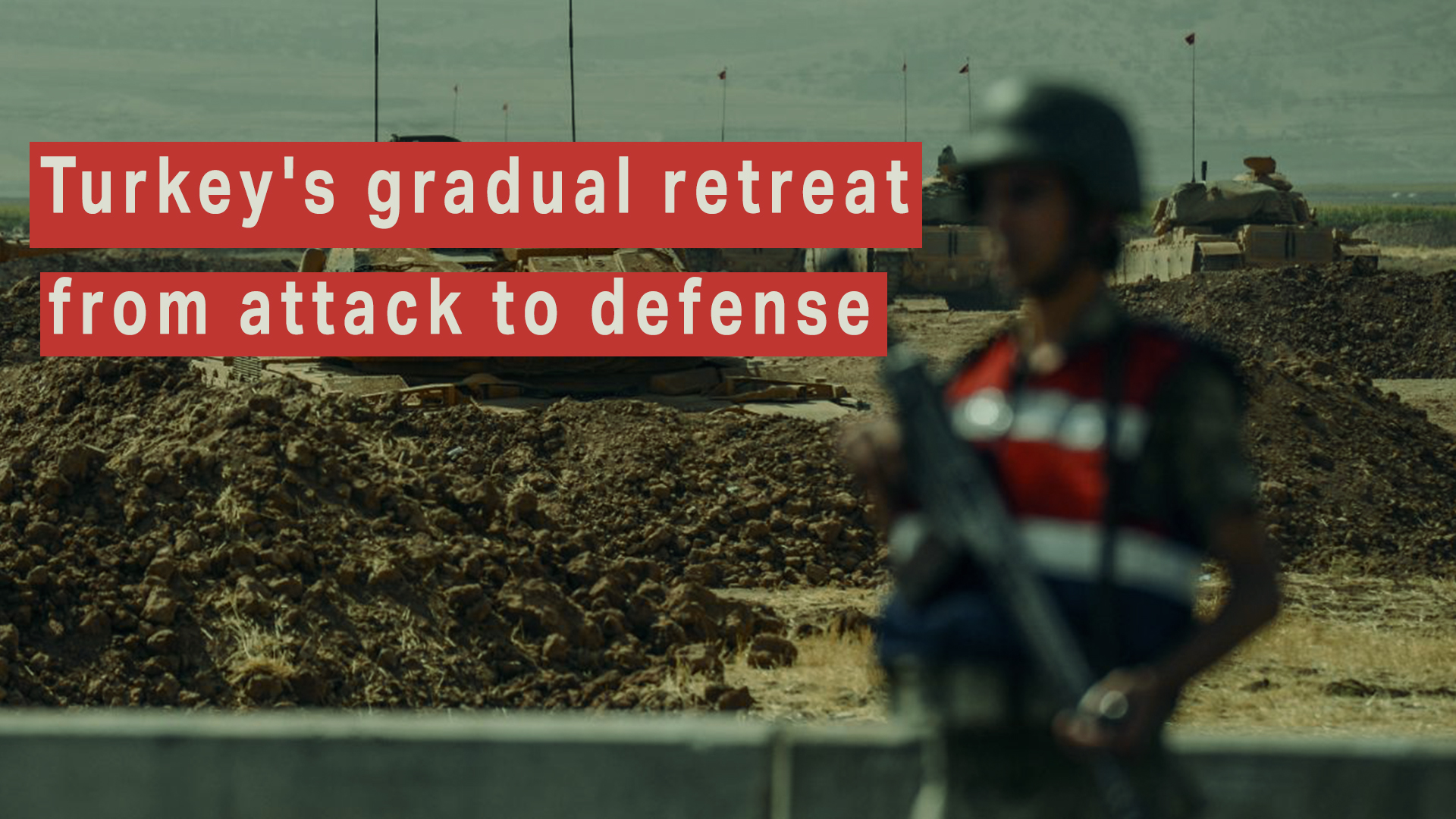Turkey’s gradual retreat from attack to defense

The past few days witnessed a series of events and popular movements, which were popular demands regarding some decisions issued by the Autonomous Administration regarding some issues, including the rise in fuel prices and the duty of self-defense. Perhaps these demands were met with a kind of caution and silence by the Civil Administration and the security forces that evacuated several points and places to preserve the civil peace.
Among the series of the events, was the popular protests of the people of the city of Manbij in the eastern countryside of Aleppo, where attempts appeared by some masked people who tried to incite the protesters to attack public property and the Internal Security Forces (Asayish) using stones and sticks. These events coincided with media propaganda on social media of the Baathist regime and the Turkish state alike. These rumors, which were spread by sites and groups affiliated with the mercenary factions, formed a kind of doubt among the observers and followers of the city’s conditions about what was happening inside.
Undoubtedly, the Turkish state was at the forefront of the countries that use the method of disinformation and media promotion, as it occupies the first place in the Middle East through the use of psychological warfare, as it is trying to weaken the opposing party by spreading false information in order to mislead public opinion. What draws attention and confirms this hypothesis is that the Turkish state has heavily focused on attempts to incite the Arab tribes inside the city of Manbij with the aim of pushing them out against the Syrian Democratic Forces (SDF) and the security services in particular. Perhaps the most prominent goal of the Turkish state and the mercenary factions lies in trying to inflame the region and push it towards instability, not enter the city and control it. Despite the Turkish state’s efforts to create a tense environment in the region through Russian forces but the Turkish state is seeking, at the present time more than before, to incite disgruntled and those who reject democracy in the regions of northeastern Syria.
What also draws attention is that if we look at the internal conditions of the areas under the control of the Turkish state in the northern and western countryside of Aleppo, we find a significant increase in protests and anger by the people of the occupied areas towards the Turkish state and mercenary factions in cases related to the violations committed by the factions against civilians and women in particular, in addition to the rampant corruption within the military structure of the mercenary factions, which has become increasingly larger than before, especially with regard to the factions’ inability to direct their guns towards points of contact with the Baathist regime. These facts come at a time when the military institution which was established by the Turkish state in northern Syria and hundreds of Turkish officers involved in files related to sexual extortion and homosexuality, which are widely spread in the areas under the control of the Turkish occupation army, which is considered one of the taboos of society, especially in northwest Syria.
In the context of the events taking place in the northern Syrian regions, the situation inside Turkey is not far from the policy of the Turkish state, and by looking at the internal situation in Turkey, we can clearly see the confusion that the Turkish government suffers from after the emergence of files confirming the government and the Justice and Development Party’s (AKP) involvement in issues related to money laundering and financing terrorist organizations inside Syria. Perhaps these files will move the Turkish street at a time when the AKP is trying to correct any mistake that would draw the attention of the US administration and move some members of Congress to suppress democracy inside Turkey. Statements issued by the leader of the Turkish mafia, Sadat Bakr, prompted Turkish President Recep Tayyip Erdogan to appear to the public and deny all the accounts made by Bakr. The Turkish state’s actions did not stop at this point, but they also reached attempts to disrupt everything by deleting the videos that were published by Sadat Bakr and banning them banning sites that published these hot-spot issues inside Turkey.
By looking at these indicators, we can conclude that Turkey seeks, through various ways, to export the internal crises it suffers from, to the Syrian interior, especially areas under its control, or to the Turkish interior, by mobilizing the areas of northeastern Syria. Turkish plans could ignite more strife in the entire region, as it is currently trying to exploit psychological warfare or what is locally known as “electronic flies” to create chaos within the regions of northeast Syria. It is possible for Turkey to repeat Afrin experience, therefore it heavily focuses on the areas of Shahba (Aleppo northern countryside where Afrin IDPs reside in) and Manbij at the present time.




